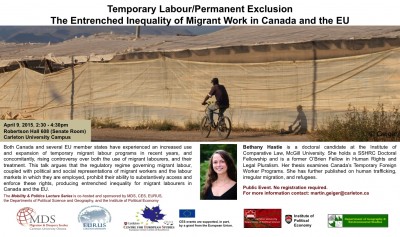Past Event! Note: this event has already taken place.
Lecture: “Temporary Labour/Permanent Exclusion: The Entrenched Inequality of Migrant Work in Canada and the EU”
April 9, 2015 at 2:30 PM to 4:30 PM
| Location: | 608 Robertson Hall |
| Cost: | Free |
| Audience: | Anyone |
| Key Contact: | Martin Geiger |
| Contact Email: | martin.geiger@carleton.ca |
Please join us Thursday April 9, 2015 for the second keynote speaker in our lecture series: Mobility & Politics: Emerging Trends and Common Challenges in Europe and Canada.
Bethany Hastie will present on “Temporary Labour/Permanent Exclusion: The Entrenched Inequality of Migrant Work in Canada and the EU”. For more information please see below or click on the poster.
Lecture summary: Both Canada and several EU member states have experienced an increased use and expansion of temporary migrant labour programs in recent years, and concomitantly, rising controversy over both the use of migrant labourers, and their treatment. This talk argues that the regulatory regime governing migrant labour, coupled with political and social representations of migrant workers and the labour markets in which they are employed, prohibit their ability to substantively access and enforce these rights, producing entrenched inequality for migrant labourers in Canada and the EU.
Guest lecturer biography: Bethany Hastie is a doctoral candidate at the Institute of Comparative Law at McGill University. She holds a SSHRC Doctoral Fellowship and is a former O’Brien Fellow in Human Rights and Legal Pluralism. Her thesis examines Canada’s Temporary Foreign Worker Programs. She has further published on human trafficking, irregular migration, and refugees.
The Mobility & Politics Lecture Series is organized by Dr. Martin Geiger (for further information contact: martin.geiger@carleton.ca) and co-sponsored and hosted by the Migration & Diaspora Studies (MDS) initiative, the Centre for European Studies (CES), the Institute of European, Russian and Eurasian Studies (EURUS), the Departments of Political Science and Geography and Environmental Studies, and the Institute of Political Economy at Carleton University.